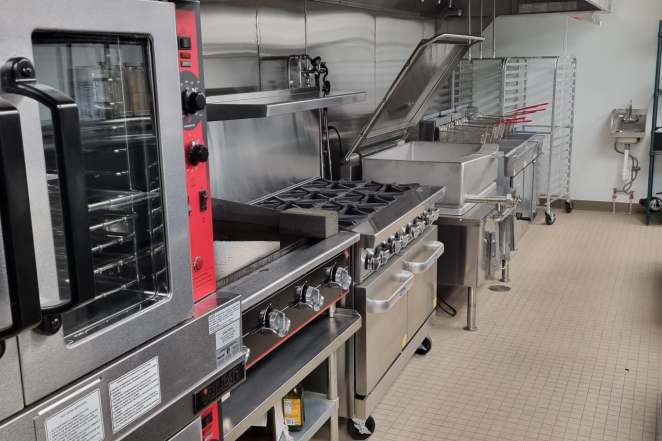Creating a Pre-Camp Kitchen and Staff Training Plan is crucial for the success of any Summer Camp Food Service operation. Here's a comprehensive guide designed to help Summer Camp Kitchens prepare for the bustling season ahead, ensuring that your team is well-trained, efficient, and ready to deliver delicious, nutritious meals to campers and staff. This guide is brought to you by the experts at Summer Camp Cooks, who understand the unique challenges and rewards of feeding hungry campers.
1. Understanding the Basics
Before diving into the specifics of kitchen duties, it's important that all staff understand the basics of working in a summer camp environment. This includes:
- Camp Mission and Values: Every team member should be familiar with the camp's mission and core values. This helps ensure that everyone is working towards the same goals and creating a positive environment for campers.
- Safety and Sanitation Standards: The health and safety of campers and staff are paramount. Training should cover proper food handling, sanitation, and safety procedures, including how to maintain a clean kitchen and prevent foodborne illnesses.
- Dietary Restrictions and Allergies: Staff should be knowledgeable about common dietary restrictions and allergies. They need to understand the importance of avoiding cross-contamination and how to prepare alternative meals that are safe and enjoyable for all campers.
2. Menu Planning and Food Preparation
A well-planned menu is the foundation of a successful camp kitchen. Training in this area should cover:
- Nutrition: Meals should be balanced, nutritious, and appealing to campers. Staff should understand basic nutrition principles and how to create menus that meet the expectations and dietary needs of a diverse group of campers.
- Budgeting: Kitchen staff need to be aware of budget constraints and how to maximize resources. Training should include tips on cost-effective food ordering, minimizing waste, and portion control.
- Pro Tip: Often times things like Hummus and Chicken Tenders are exponentially more costly if bought premade (RTE). Make these simple things all summer and they will taste better and be cheaper to produce!
- Cooking Skills: Not all kitchen staff may come with a strong culinary background. Basic cooking techniques, batch cooking, and efficient kitchen workflow should be part of the training.
- Software: Software like Cloud Cook can also help run a streamlined and organized operation. This can help provide tools for your kitchen team that certainly are worth it.
3. Teamwork and Communication
The kitchen team must work like a well-oiled machine. Effective communication and teamwork are key to managing the fast-paced environment of a camp kitchen. Training should focus on:
- Roles and Responsibilities: Clearly define each team member's role and responsibilities. This clarity helps prevent confusion and ensures that all tasks are covered.
- Conflict Resolution: Teach staff how to handle conflicts professionally and constructively. A harmonious kitchen leads to more efficient meal prep and service.
- Feedback Mechanisms: Implement systems for giving and receiving feedback among staff and with camp leadership. Continuous improvement is crucial for success.
4. Emergency Preparedness & Equipment Safety
While we hope emergencies never happen, being prepared is essential. Training should include:
- Equipment Safety Training: All kitchen staff should be thoroughly trained in the correct use of kitchen equipment. This includes understanding safety features, proper operation, and maintenance of all appliances and tools to prevent accidents and injuries.
- Food Shortages and Adaptability: Equip staff with strategies to adapt menus and meal plans in case of delivery issues or unexpected food shortages, ensuring that meals remain nutritious and satisfying for campers.
- Health Emergencies Response: Establish clear procedures for responding to foodborne illnesses or allergic reactions, including immediate steps to take and when to escalate issues to camp healthcare professionals.
- Fire Safety and Evacuation Protocols: Conduct training on fire safety, including the use of fire extinguishers, suppression systems, and the kitchen's specific evacuation plan to ensure everyone knows how to exit safely in an emergency.
5. Practical Training Sessions
Hands-on training sessions are invaluable. Organize practical sessions where staff can practice cooking meals, using kitchen equipment safely, and executing meal service efficiently. Mock service days, where staff prepare and serve meals under conditions simulating a typical camp day, can be particularly beneficial.
Why do all this?
Preparing your summer camp kitchen and staff with a comprehensive pre-camp training program is essential for a successful and stress-free (more like stress-reduced) season. By focusing on the basics, menu planning, teamwork, emergency preparedness, and practical training, your kitchen will be well-equipped to provide excellent meals and a great dining experience for campers. Remember, a well-fed camper is a happy camper!
At SCC, we are dedicated to helping camps elevate their food service operation. Feel free to contact us to talk about your Camp's Food Service. We are always willing to talk camp!

